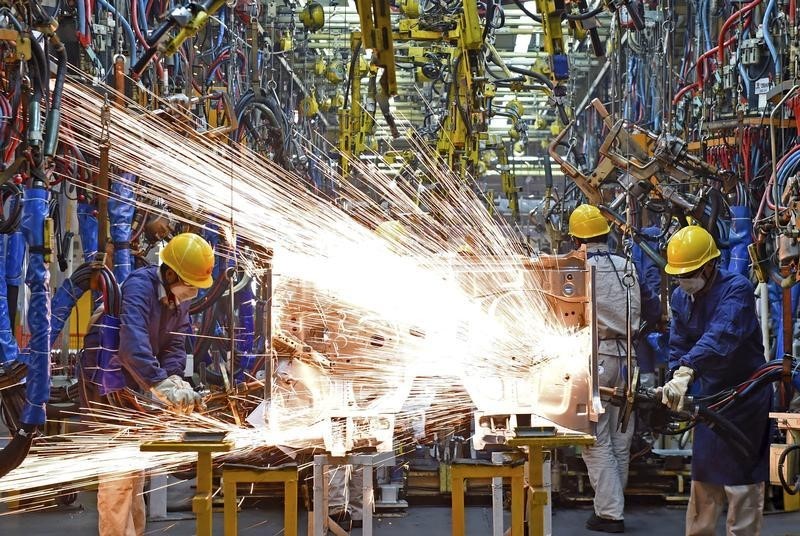By James Pomfret
DONGGUAN, China (Reuters) - Millions of migrant workers streaming back to China's industrial heartland after the long lunar New Year break are facing an uncertain future, as smaller factories in particular struggle to cope with anemic orders and rising inventories.
In the Pearl River Delta, the "world's workshop" in southern Guangdong province that accounts for around a quarter of China's exports, workers and business owners say production lines have been slower than usual to restart after the annual two-week holiday.
At the Xicheng industrial park in Hengli, several factories lay gutted with broken machines strewn outside, while plots of land earmarked for industrial use were being used by villagers to grow vegetables, a sign of the weak demand for Chinese goods that is forcing business closures and putting pressure on wages.
"Finding a factory with a good salary, that's what we want," said Luo Xianrong, an 18-year-old laid off by a factory in January, who was one of scores of migrants knocking on factory gates in the hunt for new work.
"We have to be careful. Many factories aren't providing food and accommodation, and they're delaying wage payments," she said, as her four friends nodded in unison. "I don't want to be cheated."
While global policymakers gathered in Shanghai for a G20 meeting at the weekend declared that "growth in key emerging markets remains strong", the slowdown in China - the motor of the world economy for the past decade - has unnerved investors and contributed to market turbulence at the start of 2016.
The plight of Luo and her friends underlines the dilemma for China's leaders - they want to shift the economy away from the low-end manufacturing that fueled its rise, but they also need jobs for the consumers they hope will support its next phase.
Labor activists also point to the risk of unrest, as industries consolidate and workers find their benefits squeezed.
MANUFACTURING CONTRACTION
China's manufacturing sector likely contracted for a seventh straight month in February,, with the latest numbers due on Tuesday. The official purchasing managers' index is expected to show the sector shrinking at its fastest pace since August 2012.
Exports from Guangdong province - which has a bigger economy than Indonesia - are predicted to grow just 1 percent this year, according to a January government work report.
Analysts say many of the smaller factories hit hardest by the slowdown catered more for domestic demand than the export market, another signal that the Chinese consumer is not picking up the slack as is needed to rebalance the economy.
That is bad news for policymakers in Beijing, scrambling to stabilize swooning financial markets and with growth slowing to 6.9 percent last year, its weakest in a quarter of a century.
Stanley Lau, who runs a watch factory, said uncertainty in Europe, including the refugee crisis and a possible exit of Britain from the European Union, could further sap consumer confidence there, and impact China's factories.
"There will be certain numbers of factories that will have some changes, by narrowing down the scale of the factories or moving to other places," said Lau.
"We follow the market trend. If we won't receive sufficient orders by mid-year ... We'll have to reduce our workforce. But for now, we'd like to keep our workforce steady."
"LIFE AND DEATH"
While makeshift recruitment booths and signs advertising jobs remain a fairly common sight in the Pearl River Delta, the labor market is seen getting tighter in the coming months.
"The life and death of enterprises ... is to be expected," said Xu Jianhua, the Communist Party Secretary of Dongguan, a major industrial city there, at a recent press conference.
He said 39,000 enterprises had shut down in Dongguan last year, including around 500 foreign invested firms, though he stressed the number of new businesses registered in the same period had outnumbered those closing down.
"The economic challenges will be more complex" in the year ahead, he added.
The outlook appeared better for some larger factories with steady revenue streams, including electronics makers such as Foxlink, a subsidiary of Hon Hai (TW:2317), Apple's (O:AAPL) main contract manufacturer in China.
"We've got these stalls in many factory towns now," said Wang Chunshun, a recruiter for Foxlink who'd pitched several plastic stools and a glossy recruitment poster on the pavement next to a highway and a large industrial estate.
"Our company needs new workers, we've still got a lot of orders."
Some workers interviewed in Dongguan factory towns suggested the chance of labor disputes or strikes was growing.
"I heard from some friends, who didn't get paid by their boss, that the government did nothing to help them," said Zhou Huazhong, a worker at a motor factory in Dongguan, who was smoking a cigarette during a break. "The government is useless."
The real challenge for China's leaders is whether the economy can create enough new jobs in sectors they are trying to encourage, such as biotechnology or robotics, to replace those lost lower down the chain.
"Basically the employment situation is in a state of flux, factories are closing down," said Geoffrey Crothall of China Labor Bulletin, a labor rights advocacy and monitoring group.
"Opportunities are coming up in new manufacturing areas but the question is, are these jobs sustainable? A lot of start-ups are failing and the jobs they're providing aren't often well-paid or offering decent work conditions."

($1 = 6.5390 Chinese yuan renminbi)